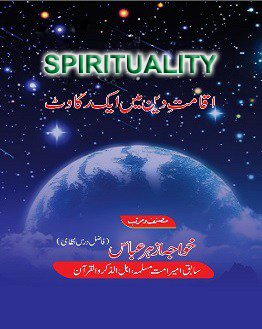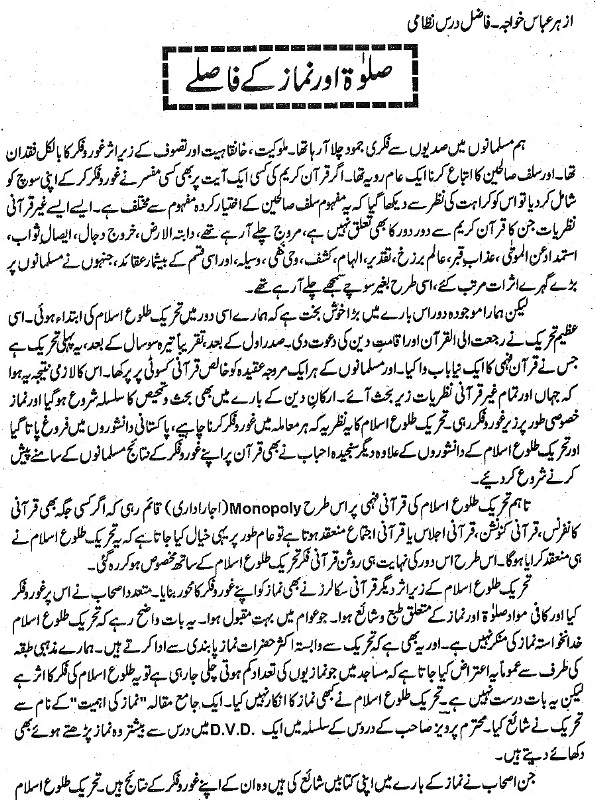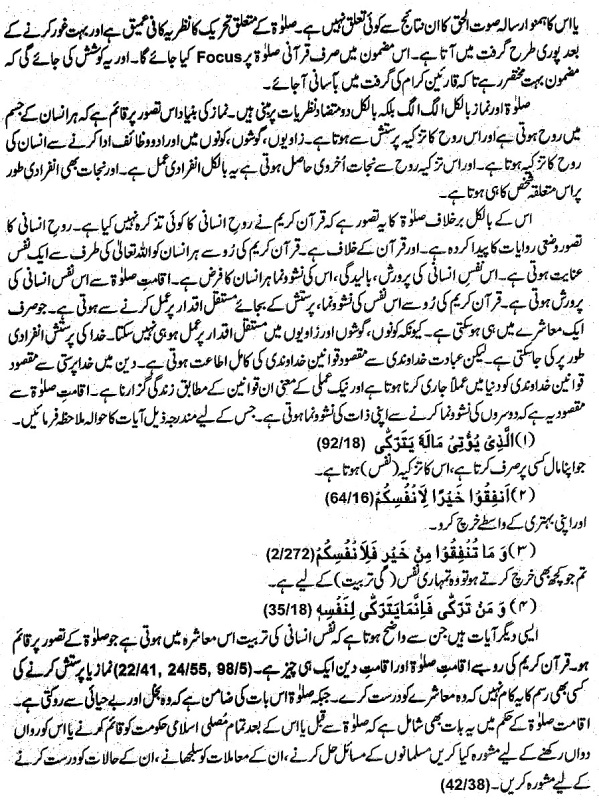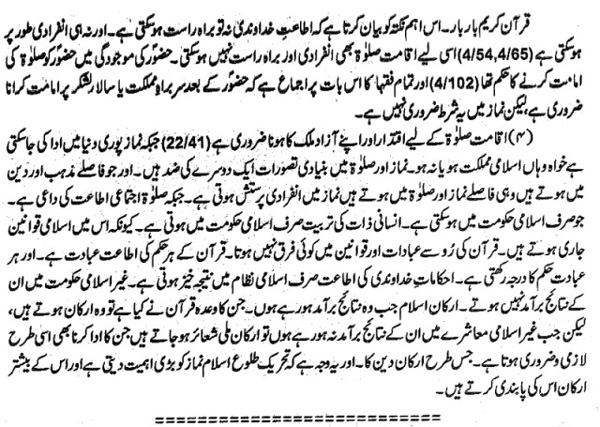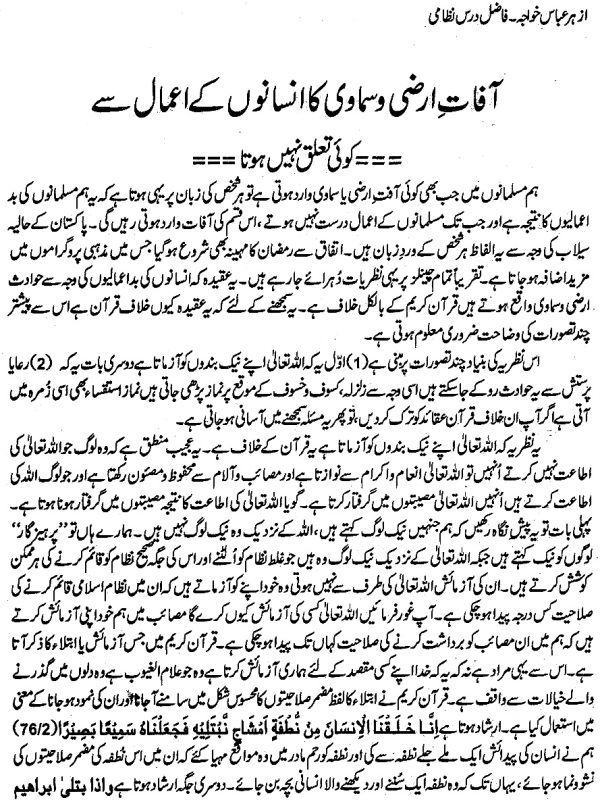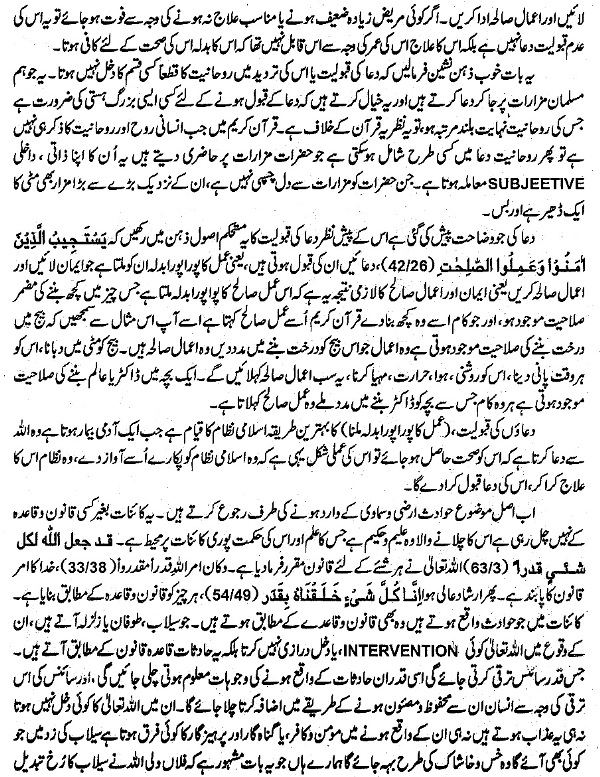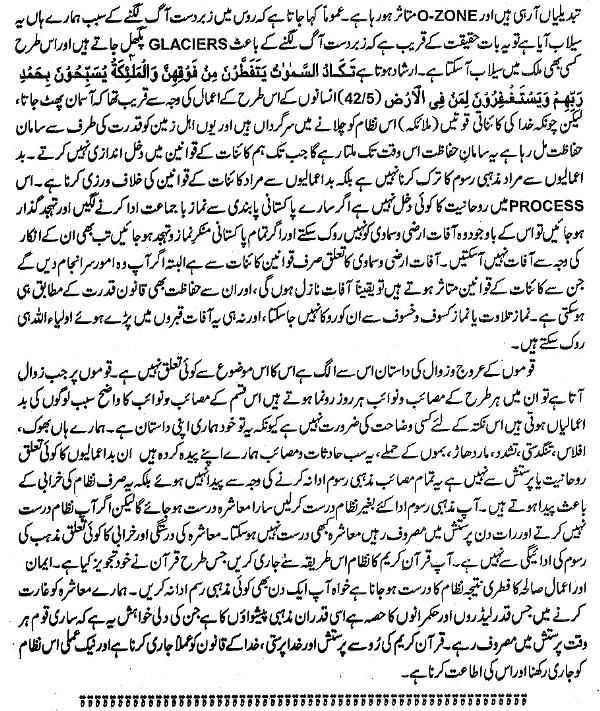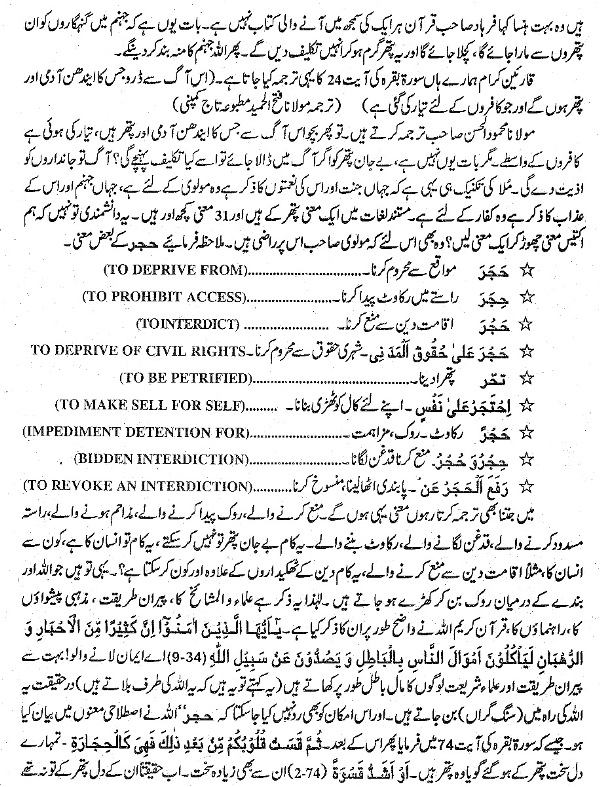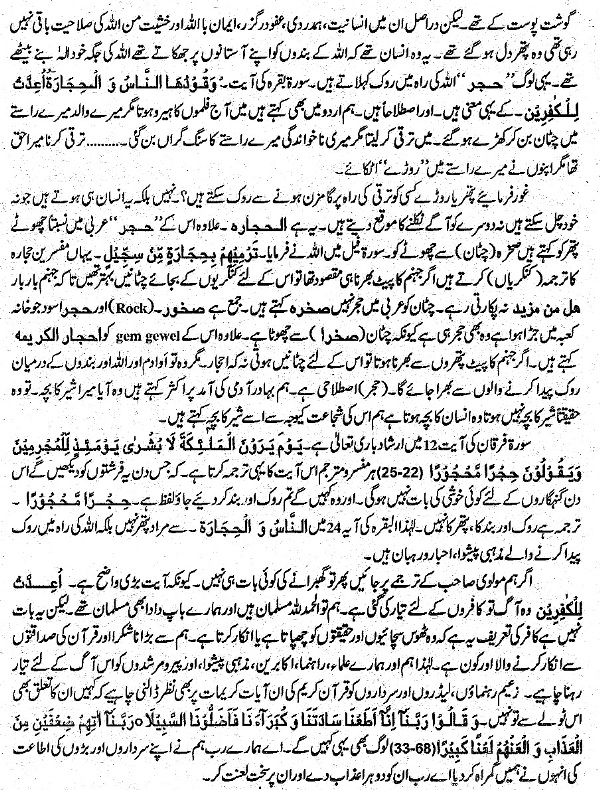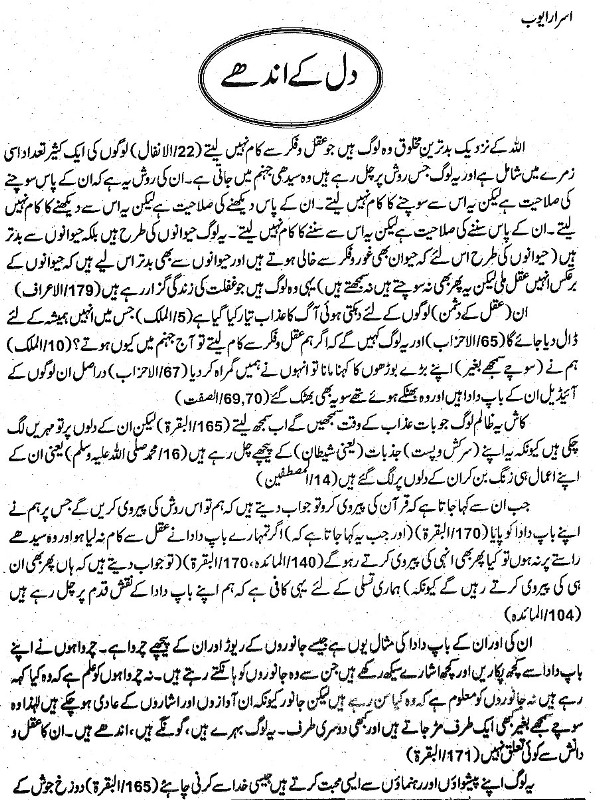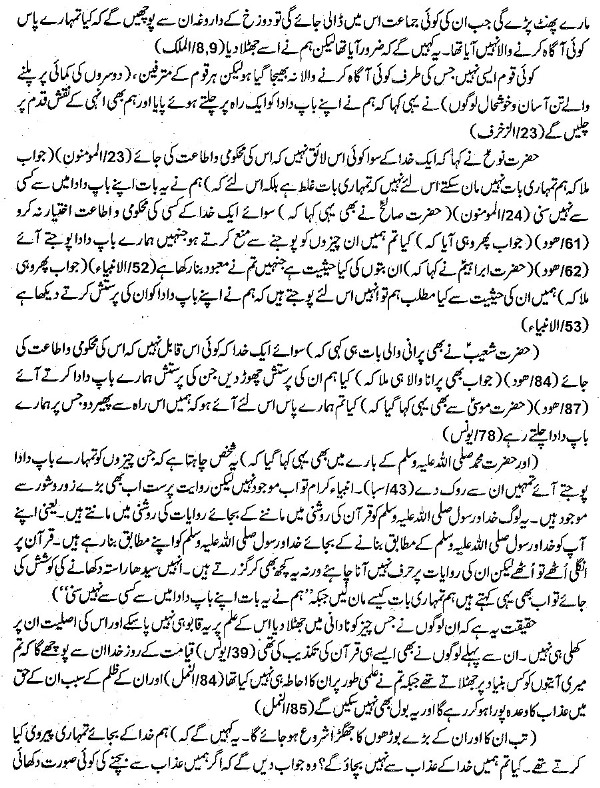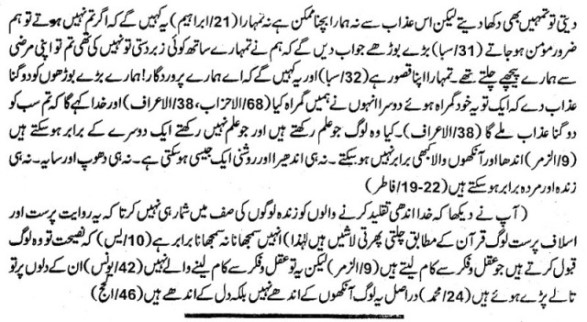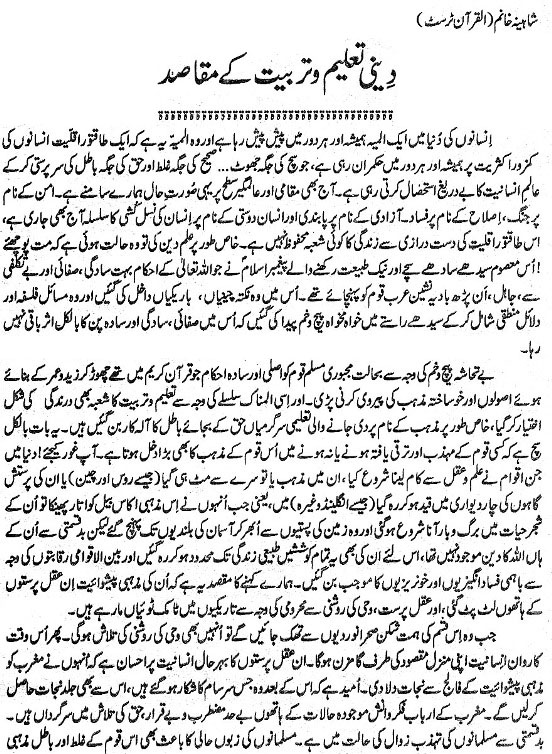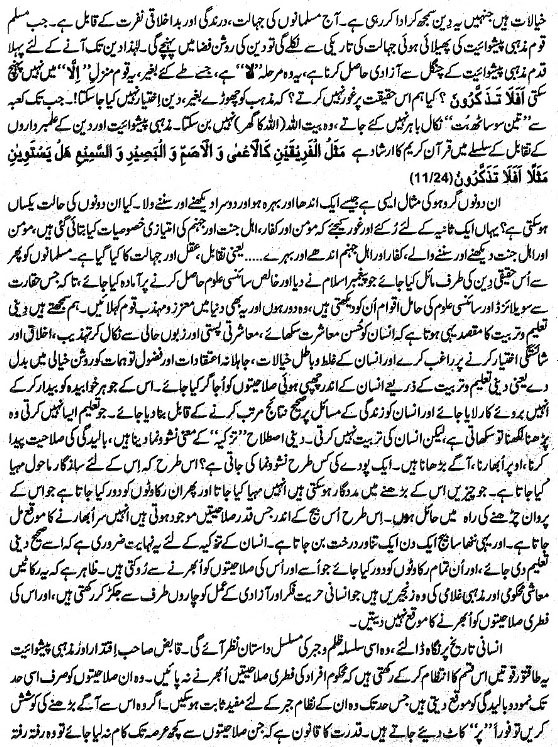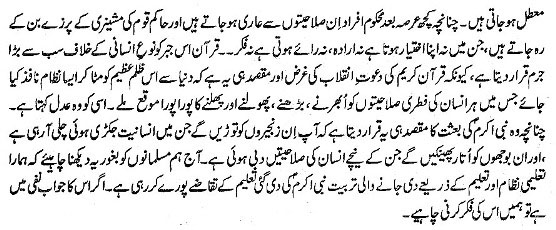ROOHANIYAT (SPIRITUALITY):
A HURDLE IN THE WAY OF ESTABLISHMENT OF DEEN
BY
KHAWAJA AZHAR ABBAS
FazilDarsNizami
INTIBAH
A DIRE WARNING
Only that person is a Momin (believer) who believes that the Qur’an is the complete, final and unalterable revelation from Allah. It is obligatory on every Momin that he makes complete and total efforts for the establishment of Deen in his worldly life. Whichever part of the world they dwell in, believers should make efforts for this purpose, as the Divine social order is not linked to any specific time or geographical space. It should be the effort of every Momin to uproot all false ideologies and philosophies and to establish the way of life devised by Allah. Obedience to such a way of life will be obedience to Allah and His Messenger. Whoever wishes to obey Allah and His Messenger, it is expedient for them to establish the way of life given to them. Those who wish to spend their lives under a way of life different than that given by Allah and His Messenger are disobedient rebels no matter how much they may worship. To live a life which is contrary to the way of life prescribed by Allah is Haraam or unlawful. Any livelihood that one earns under such an arrangement is Haraam.
PREFACE
Since the inception of time there have been two main ideologies that have been at loggerheads with each other.The first is the mechanistic and materialistic concept of life, which considers that life has only a physical and material existence and that the human being is limited to the human body. In this worldview, the human body, which is subject to physical laws withers away with time. Once the body dies then that is the end of life. The proponents of this ideology maintain that the human body disintegrates upon death and that’s all there is to it! The Qur’an paraphrases this mentality in the following words:
“And they say: There is naught but our life of the world; we die and we live, and naught destroyeth us save time; when they have no knowledge whatsoever of (all) that; they do but guess.” (45:24)
In contrast to the materialistic concept of life, the Qur’an offers another worldview, and it is the one to which all Messengers of Allah invited towards.According to this concept, the human being is not limited to his material body only which disintegrates with the tide of time, but he also possesses aNafs or the self. The human body perishes with death but the Nafs or the human self, once it attains life continues in afterlife. In the words of Iqbal:
I have learned this point from AbulHasan
That life does not die with the death of the body
The Qur’an states:
“..and He began the creation of man from clay; Then He made his seed from a draught of despised fluid; (32:7-8)
Then it states:
“Then He fashioned him and breathed into him of His Spirit; and appointed for you hearing and sight and hearts. Small thanks give ye!” (32:9)
It should be borne in mind that the Qur’an does not in any of its passages give the idea of a human spirit. It only speaks of the spirit of Allah, a form of divine energy.When Allah’s spirit is conveyed to man, it takes the form of the Nafs or the human self. In view of this, the human being consists of two components, the physical body and the nonphysical self.
Our Scholars and Sufis have failed to detect this vital Quranic distinction and termed the human being to consist of a body and a spirit, and have elaborated that the growth of the spirit is the goal of life. But as the Qur’an does not accept the existence of the human spirit, it has not given any laws by which the spirit will grow and develop in any way whatsoever and any such laws were invented by the Sufis of their own accord.. The laws which the Sufisinvented were not meant to develop the spirit but in fact they were supposed to annihilate it, and they gave the purpose behind such laws that the human spirit was to ultimately merge in the divine spirit!
The procedure they adopted for annihilation of the spirit was that of worship, and claimed that its results would not be manifest in this life but only in the hereafter. With belief in annihilation of the spirit, man starts to despise the world and wishes to live as a recluse with a negative attitude towards life. All worldly objects seem lowly and insignificant and man pursues a monastic way of life. No value is then given to perceptual knowledge and any benefit of harnessing of the laws of nature is considered meaningless and its knowledge is ridiculed. In the words of Rumi:
Xxxxxxxx
Hence the nation that adopts the spiritual worldview eventually perishes. Imagine, when a nationwere to not even acknowledge that the world exists as a reality and consider it a figment of one’s imagination, escapes from acquisition of knowledge and shun worldliness in all its forms, then how can such a nation prosper or progress? This is what Sufismteaches and regrettably our people are deeply steeped into it. In the Quranicworldview, there is neither any room for the human spirit nor of people possessing it. Thus spirituality in the form of shrines, Urs, Sufi orders, beliefs on intercession, and likes thereof have no basis at all and have no connection with reality. If such were indeed a part of Deen, then the Messenger of Allah (PBUH) would have indeed embodied them in a perfect form. But in contrast the Qur’an termed the Messenger of Allah’s character to be his pinnacle:
And thou (standest) on an exalted standard of character. (68:4)
In so far as the praiseworthy rank of the messenger of Allah is concerned, it applies to his person at that juncture when he established such a community that everyone who witnessed its marvel gave praise to its founder.This is the juncture where Sufism fails, as it calls for shunning society rather than playing an active part in it. The verse “And thou (standest) on an exalted standard of character.” (68:4) terms the character of the Messenger of Allah as his greatest trait. If indeed spirituality were that important, it would have at least been mentioned in the Qur’an as something of merit.
The Qur’an has indicated that the combination of the body and the self is the whole human being. According to it, the human being is not limited to just the material flesh and bones but also has a human self. When I say “my hand”, “my foot”, or “my body” then this entity, which is separate from my physical body parts, is the self. And the foundation of an Islamic society is on the basis of this very self-concept. To develop the self is obligatory on man. Its development is possible in that society which is established on permanent values.The development of the self occurs when we spend on others, as stated in the words of the Qur’an:
Who giveth his wealth that he may grow (in goodness). (92:18)
According to the Qur’an we nourish our selves when we provide nourishment toothers.
“…He who groweth, groweth only for himself…” (35:18)
Human potential is realized fully when divine attributes are actualized in our person within human limitations and by this our self gains so much strength that it survives death and qualifies itself for the next stages in the hereafter. The fact of the matter is that spirituality is merely a label for it has no practical bearing on reality. In the words of the Quran:
“They are but names which ye have named, ye and your fathers, for which Allah hath revealed no warrant. They follow but a guess and that which (they) themselves desire. And now the guidance from their Lord hath come unto them.” (53:23)
This book is an elaboration of this very point, namely that spirituality has no basis in Qur’an. The book has some essays that have been penned by the author from time to time, therefore readers should expect a certain amount of conceptual repetition. Whereas other essays have been reproduced with the kind permission of journals Tolu-e-Islam and Balagh-ul-Quran for which the author is grateful.
In the Name of Allah, The Most Gracious, The Most Merciful
TAQREER
(Speech)
Dear Listeners
Assalamu alaikum
This voice that you are listening to is Khawaja Azhar Abbas’s voice and today we are going to shed light on an important subject. In the entire universe, life is revealed in all its glory. If you sow a seed in the earth, then within a fixed time and through a due process this seed becomes a strong tree. The life in Earth makes this seed into a tree. Trees,plants, flowers, grass; all are part of this life on Earth. When this life evolved from the level of animals and reached the human level, then Allah granted it an energy, which raised it from animal level to human level. The Qur’an names this energy as Rooh (Spirit). After attaining this energy, man is able to think, reflect and able to use his faculties and also becomes responsible as well as accountable for his conduct. When this energy is attributed to God, then the Quran terms it as Rooh. But when this energy is attributed to man, the Quran terms it as Nafs (the Self). Quran acknowledges Roohor Spirit of Allah but denies Rooh of man. All the religions of the world acknowledge belief in Rooh of man, but the Qur’an has challenged them all and refuted the existence of Rooh of man.
In the Qur’an the word Rooh has occurred in about twenty instances out of which in seventeen locationsRooh has meant Wahi (Revelation), its bringer and its recipient. The commentators have also interpreted Rooh as Wahi but in three instances this word has occurred for breathing of Rooh. The word Roohaniator Spirituality has not occurred anywhere in Quran. It is unfortunate that our scholars have failed to make a distinction between Rooh and Nafsor the Spirit and the Self. They term Nafs of man as Rooh and this mistake led to the downfall of the Muslims. As the Quran does not acknowledge the existence of man’s Rooh, it has not mentioned any means or methods for its development. Our scholars and mystics devised their own methods for developing Rooh and all these led to our downfall. They termed the Rooh to be an antithesis of matter and instilled disregard for all things material. They did not term society as a necessary ingredient for development of Rooh but suggested isolation from it in ritualistic worship. They denied the existence of the universe and termed it an illusion. This belief is known as Wahdat-al-Wajood(unity of being) and it is the foundation of Tasawuf (Mysticism). Our entire poetry whether it be in Persian or Urdu revolves around this concept. Thus belief in Rooh of man and ways devised for its development have led us to ignominy. In contrast to the belief of scholars and mystics, the Qur’an asserts that the human being is a combination of material body and Nafs. When a human child is born then it is a few inches combination of body and Nafs. Its body develops by observing physical laws, whereas its Nafs does not. The child possesses a Nafs in undeveloped form and it is the objective of life to develop it. To act on Quranic permanent values is necessary for the growth and development of Nafs and for this life in a society is expedient.
As its foundation, an Islamic system requires belief in Nafs. Its first principle is:
92/18
Secondly,
35/18
Thirdly,
59/9
An Islamic system will evolve when individuals within it work for development of their Nafs and actualize Divine attributes within human limitations in their persons. In this social order, every individual cares for the other, thus his own Nafs gets development in this way and the collective flourishes. In this system every individual acts on Allah’s attributes of As-Salaam and Al-Momin and gives peace and security to the society at large. The basis of Deen is belief in Nafs. Believe in it acts in the development and stability of society at large, whereas belief in human Rooh results in its destruction and downfall. A publication of mine titled “Roohaniat: Iqamat-E-Deen main Rukawat “(Spirituality a hindrance in the establishment of Deen) is available on my website. Its perusal will make matters more clear on this subject.
THE STORY OF HUMAN LIFE:
IN THE LIGHT OF QUR’AN
We can witness where life stands today. We are all facets of this life and diverse forms of its various manifestations. Life came to where it is now after thousands of years and after changing numerous patterns. But exactly how life came about, this is neither indicated by science, nor does the Qur’an shed any light as to how it appeared. However the Qur’an cites the various stages, from inception to the present form that life has passed through. It begins by narrating the very genesis of life. It may be that prior to presenting life in its material cellular form, Allah Almighty created life but as it was not within the grasp of our consciousness we were termed as ‘dead’, and when life began, that period was interpreted as the period of our ‘after life’.
All living things whether they pertain to the Animal Kingdom, the Planet Kingdom etc. are all part of a chain of life. All beings are classified according to their material components and body shapes and parts and all are part of a link. All life forms sprang from the primordial stage of genesis in accordance with precise laws and measures and kept changing shapes and patterns, finally reaching the form of man in its extremity. In its length and breadth, life is indivisible. It has travelled in unity for thousands of years and reached its present form. Thus no matter how diverse the human population may be, they all share a common humanity. No member of the human population has any basic features missing which are common to all. E.g. no human exists that he does not possess a free will for the possession of a free will is a basic feature of humankind. Thus all features of life such as the ability to move, the propensity to reproduce etc. are inherent in the species.
The noble Qur’an has argued for the evolution of human life as well as for the creation and evolution of the material universe. (However this essay is concerned only with the subject of human life).
Here we will explore and refute the various un-Qur’anic concocted traditions concerning the origin of human life as they are prevailing amongst the Muslims and the hilarious problems they have given rise to. Next we will examine the Qur’anic viewpoint regarding the subject.
Regarding the origin of human life, the view that is prevailing within the Muslims is that God made an effigy of Adam and then breathed his spirit into that effigy and gave it life. Then the angels were informed by God that He was sending his vicegerent on earth as the first man but the latter objected and claimed that he would do bloodshed, to which God replied that He knew what the angels did not know. According to this traditional belief, Adam was created instantaneously as a finished product. Then Adam’s progeny descended from him. The traditional view is that the first woman was created from Adam’s rib, which would in fact make her his daughter! Thus father and daughter were converted into husband and wife, according to this traditional view. In contrast to this, we see that in Allah’s revealed law, marriage between father and daughter is prohibited.
Thus there are numerous objections that apply to the traditional concept. The origin and development of life in the light of the noble Qur’an shall be presented later on in this essay, which will resolve all such objections.
Human life is a likeness of electrical energy, which is universal and is spread all around us in all its glorious illumination. The millions of bulbs that are alight by it are facets of the same energy. Similarly like energy, life itself is an indivisible unity and its parts are various facets of the whole.
When Divine energy joins with the consciousness, the resultant is the human form. In other words the human self comes about with a union of life and consciousness. Some of our earlier Sufis who subscribed to the belief in Wahdat-ul-Wujood or unity of existence likened life with a string. They claimed that if knots are tied to a large piece of string, then each knot gives rise to a specific shape, and if all the knots were untied then only the string i.e. Wahdatul-Wujood remains. In contrast to this, the view expounded by Tolu-e-Islam maintains the analogy that once a knot is tied and a shape appears then that shape is there for its own sake and is not effaced, whereas the string has a separate existence of its own! Thus our existence (the knot) is separate from the Divine oneness.
Let us now turn to the Qur’an regarding this matter. Concerning the origin of human life it is stated:
“And He it is Who hath produced you from a single being [NafssinWahida]..” (6:98)
The Qur’an itself provides the exegesis of NafsinWahida as:
“Verily We created man from a product of wet earth [Sulalatin Min Teen]” (23:12)
In other words NafsinWahidaand Sulalatin Min Teen are two facets of the same thing and have been used interchangeably.
Similarly for the genesis of life some other words have also occurred in the Qur’an. For example, it is stated in SuraSaffat:
“..Them have We created out of a sticky clay!” (37:11)
In Surat Al Hijar it is stated:
“Verily We created man of potter’s clay of black mud altered,” (15:26)
In SuraRahman it was said:
“He created man of clay like the potter’s.” (55:14)
Man was created from putrid mud baked in fire, this is the feature of that earth from which Adam was made. Our planet was initially a sphere of fire, and its earth was baked in form. The earth which is mixed with water is called Teen, whileLazibmeans Sticky. Afterwards the words HamainMasnoon have occurred. Hamain is that mud which is extracted from a well and carries with it a foul smell, while Masnoon means putrid or rotten.
Therefore in view of these inflections it is clear that wherever on earth the dust became SalsalilKalFakhar and rotted into foul smelled HamaimMasnoonin those locations initial human life cells appeared through Sulallatin Min Teen.
But our early commentators failed to grasp these concepts because they did not have before them the correct understanding of NafsinWahida. They were under the influence of Jewish nomenclature as an aid for Qur’anic interpretation and that material led them to believe that the human was created instantaneously from an effigy, even though the Qur’an had stated in numerous passages that God had created man from dust.
The era of our previous exegetes was not an era of enquiry and investigation and they relied simply on conventional wisdom, thus becoming prone to mistaken views. However today’s scholars must pursue the matter with intellectual rigor and review interpretations of the past objectively. It is vital to pursue the subject in this manner as it concerns with the proof of Qur’an’s divine origin.
In this regard it is expedient to clarify the two points so as to present the correct Qur’anic viewpoint. Firstly, it is clear that life did not originate from the effigy of Adam rather it originated from earth and that too at various places.
Secondly the Qur’anic term NafsinWahida does not allude to the effigy of Adam but the single cell from which all life form originated. Clarification of these two points is thus vital to bring forth the Qur’anic viewpoint.
- The Qur’an refutes the view of creation springing from the effigy of Adam in verse 11:61
“..He brought you forth from the earth and hath made you husband it…” (11:61)
- “Thereof We created you, and thereunto We return you, and thence We bring you forth a second time.” (20:55)
- “..He is best aware of you (from the time) when He created you from the earth..” 53:32
- “… And Allah hath caused you to grow as a growth from the earth.” (71:17)
The above four Qur’anic verses are clear proof that human life sprang from the earth in different locations, and wherever the earth was in the form of HamainMasnoon, and was putrefied over there it became Sulalatin Min Teen giving rise to Amoeba and thus life scattered throughout the earth.
By NafsinWahidatin, Adam’s effigy is not implied but that original unicellular organism from which all life came forth. The verse which mentions NafsinWahida is worthy of much reflection as well as grammatical analysis
“He it is Who did create you from a single soul, and therefrom did make his mate that he might take rest in her. And when he covered her she bore a light burden, and she passed (unnoticed) with it, but when it became heavy they cried unto Allah, their Lord, saying: If thou givest unto us aright we shall be of the thankful.” (7:189)
In the Qur’an the term NafsinWahida has occurred on five occasions. These are 4:1, 6:98-7, 31:189, 6:28-39. The commentators have understood Adam’s effigy by this term but it is apparent upon reflection on the Qur’an that tilllife has reached the standard of humanity the term refers to the single life cell, as expounded in previous verses. And when life entered the human body then the process of reproduction between male and female took form, and then the term then refers to the human sperm, like it will be established in the verse 7:189 that although the commentators refer this verse to Adam, but we shall see that it refers to none else but the human sperm.
AllamaMashriqi in his book Hadith-UL-Qur’an mentioned two extremely valuable points. Firstly that the manner of human reproduction is not worthy of his dignity and that by it, the status of humanity is degraded. He has also conjectured that perhaps after hundreds of thousands of years from now, a new method of reproduction shall apply to humans, one which shall be more honorable.
Now we shall explicate verse 7:189. In this verse the commentators have rendered Khalaqakum in past tense i.e. “he created you all”, but it is the style of the Qur’an that for a continuous event it uses the past tense. Although past tense is used, but it is in fact a present-continuous phenomenon which is being described. E.g. Allah says:
“.. and sent down rain from the heavens; and brought forth therewith fruits for your sustenance; then set not up rivals unto Allah when ye know (the truth).” (2:22)
In this verse Anzala and Akhraja are both in the past tense, but they refer to a continuous SunnatAllahor a continuous practice of Allah that rain descends from the sky and produces herbs with it. Just like the words in 2:22 are in the past tense but describe a phenomenon that is in the present the words Khalaqa and Ja’ala in 7:189 although are in the past, they refer to a present-continuous phenomenon. Further see verses 2:164 and 13:17 to corroborate this view.
By NafsinWahida a single life cell is implied which now appears in the form of the human sperm and from which male and female, men and women are formed.
This human sperm has its corresponding pair placed within it. In other words one sperm has the propensity to be either male or female. By interpreting NafsinWahidaas the life cell or life sperm the correct understanding of Qur’an is achieved and all un-Qur’anic views are refuted.
Such scientific foreknowledge about the origin of life and its various stages given by the Qur’an in the dark ages of fourteen centuries ago is proof of its divine revelation.
We are actually all representatives of that first life cell which went through various stages to become a full-fledged human being. Now the question arises as to whether there will be further evolution of man or whether man has reached his peak of excellence. According to Qur’an, human life will progress further.
The physical development of the body that has taken place for thousands of years has been at the behest of physical laws and now the same physical laws apply on us. Cold, heat, hunger and thirst etc. thus these laws influence all circumstances. But when it comes to life of man, these laws do not have an absolute bearing for its progression, for life progresses further by the application of divine laws.
This is the juncture at which man is in need of divine laws. This is so because man-made laws do not apply on the progression of human life. The permanent values given by divine revelation are that beacon that they develop life as much as we actualize them in our persons. Its procedure is such that in case there is a conflict between our selfish interest and a permanent value, then in case preference is given to the selfish interest then this leads to retardation of life. But when one prefers divine permanent values above personal interest and follows them, then this results in the growth and development of life. For example if you are in financial hardship and you have to pay the school fee of your children and you have limited means of subsistence, then the offer of income through bribery and corruption appears lucrative. If you pursue your selfish interest, accept the bribe and ignore the permanent value then your life will not grow. This is so because you went against the divine permanent value that prohibits devouring Haraam wealth. But in case you do not accept the bribe and to the detriment of your selfish interest follow the divine permanent values, then your life will progress. This happened because you observed the divine law, which made Haraam wealth unlawful. Thus it is only by following permanent values that life grows and develops. Thisis possible only through divine revelation because human intellect is incapable of reaching permanent and absolute values. Apart from divinely revealed permanent values, no other law provides growth to life.
The divine code given by Almighty Allah in the Qur’an has permanent values as its foundation. That is why wherever this divine code is established and obeyed therein the human self will find nourishment.
The man made system of Taghoot has many of its laws whichare contrary to permanent values. For example according to permanent values consumption of Riba is unlawful. Now in a system that is based on Riba life will never find growth and longevity no matter how much diligently one prays and fasts in it. Similarly private property is against the permanent values and a society where private property is lawful will never find growth and longevity to life in such a society.
For growth and longevity of life it is mandatory that such a system is established which is based on permanent values. Such a society where permanent values are established, life grows and develops on its own initiative. This is so because permanent values freely actualize themselves in such a society.
Thus a believer is the one who accepts the noble Qur’an as the last and final constitution for life given by Allah to mankind and who strives to establish it to the best of his ability. Wherever he may be, he has to strive for this cause to the utmost of his ability, as the divine system is not dependent on any particular time or location. His effort should be to uproot all other systems and establish God’s system on God’s earth, as obedience to such a system means obedience to Allah and His Messenger and this will give longevity to life.
Those who wish to obey Allah and His Messenger and wish to progress their life through the application of permanent values, it is mandatory for them to establish the divine system in their lives. Remember those who desire to spend their lives under a system other than the system based on divine permanent values will never find growth and development of life. Such people are in rebellion to Allah and His Messenger and in the words of the Qur’an they are criminals (6:123) no matter how much observant they are of prayers and fasting.
In short, by following permanent values, life progresses and finds stability. If at the time of death it becomes strong enough to sustain death then it travels to further stages and this is its Jannat. And if at the moment of its death it does not progress furthermore then this is its Jahannam. Jannat and Jahannam are not specific places where people are sent off to in relation to their deeds but they are interpretations of modes of life. It is also possible that this new species that we become has more senses than the five senses, perhaps eight or nine or ten. In animals the addition of a sense makes a huge difference in their ability, so we must imagine how profound the impact would be on a new species. Now the progress would not be of the human physique but of life itself.
We have stated till now that life began with NafsinWahida and prior to reaching the level of humanity Nafs meant the life cell. When life reached the human level and procreation and reproduction became the means of its propagation the Nafs became the human sperm. In support of these concepts we have presented verses of the Qur’an and we have also established that life did not originate from one Adam but that wherever life cells were born therein life developed and life originated in different locations. On these matters all the Ulema of the Ahl-e-Qur’an sect are unanimous. But how life entered the stages of humanity, on that matter the Ahl-e-Qur’anUlema differ. Hence we present a different story of life.
The alternate story of life, purely from a Qur’anic point of view
All the religions and faiths of the world agree on the existence of the human soul. We Muslims too consider belief in the soul to be vitally important. Spiritual development is seen as the means of salvation in afterlife. But the aforementioned Qur’anicUlema are not having belief in Rooh or Nafs.
To them, the human body is itself a marvel of God’s creation and only it, i.e. the body will be resurrected on the Day of Judgment. It is to the body that all questions of accountability shall be made. To this group of scholars, man is not a combination of body and soul but merely the sum total of ingredients. There is no Rooh within the body because of which there was life, such that when the Rooh were to leave the body was to die. On the other hand those who believe in the existence of the soul their point of view is that the body is without consciousness. While it is the spirit (Rooh) that has consciousness. And when someone is addressed, then we essentially are addressing the Rooh and not the body.
The Qur’anic point of view is that the body has consciousness and there is no consciousness distinct from it. Consciousness is born with the body and it dies with the body. Allah says:
“How disbelieve ye in Allah when ye were dead and He gave life to you! Then He will give you death, then life again, and then unto Him ye will return.”(2:28)
The above verse addresses all mankind and particularly those in possession of consciousness. An unconscious entity cannot be addressed. Thus when the body is addressed it is the consciousness that is also being addressed. Allah gave you life and will give you death and will resurrect you. It is obvious from the verse that consciousness is within the body and upon it is the bearing of life and death. When the human body is born from a mother, it is alive and when it dies it is the body that dies. Therefore the addressee of the aforementioned verse is the body upon which life and death impacts. Consciousness is thus a part of the body. There is no such thing as a soul distinct from the human body that it dies.
Here the word Kuntum (You all were) is significant in the above verse. This term is inclusive of the consciousness and is not addressed just to the body alone, for the body is never addressed without the consciousness.
When the body’s ingredients go weak, consciousness also grows weak. That is why we do not recall the events of our childhood. When the body’s components are strong the consciousness is also strong.
Those who believe in the existence of the soul maintain that after the formation of the human fetus in the womb, a soul is given to it sometime after the pregnancy and when the body dies then this soul travels to Barzakh and on the day of judgment people will be held accountable and it is this soul that will re-enter the body. Thus souls are immortal and are not impacted by death.
Firstly this concept is all together erroneous which maintains that the embryo is devoid of life without a soul being given to it. The embryo is very well alive to the extent that it has the masculine and feminine traits inherent within it to become either. There is no need for life to enter in it. The Qur’an has narrated five stages in which the embryo develops within the mother’s womb.
“Then fashioned We the drop a clot, then fashioned We the clot a little lump, then fashioned We the little lump bones, then clothed the bones with flesh, and then produced it as another creation. So blessed be Allah, the Best of creators!” (23:14)
Nutfa is not included in these stages because it is itself alive. Were it devoid of life, it would not have been possible for it to travel from one stage to the other. The point of reflection is that in the above verse Allah has mentioned all the stages that an embryo goes through but nowhere has He mentioned the breathing of a soul. If the granting of the soul were such an important event then the Qur’an would have indeed mentioned it.
“Allah is He Who shaped you out of weakness, then appointed after weakness strength, then, after strength, appointed weakness and grey hair. He createth what He will. He is the Knower, the Mighty.” (30:54)
In this verse the period of childhood as well as old age are mentioned as one of weakness. The consciousness is also weak during these ages in a person. When full manhood is attained then this is the period when the consciousness is also of full strength. Observation of the frailty as well as the strength of the human consciousness makes it clear that it is part of the body and is not separate from it. Once the body dies, the consciousness also dies. Apart from this it is also worth reflecting on individuals with mental illness. If the mental faculties are not present then does this imply they do not have a soul?
NafakhRuh – Breathing Of Spirit
The Qur’an mentions the breaking of spirit or NafakhRuh in three instances. In 15:29 and 38:72 similar wordings have been used.
“So, when I have made him and have breathed into him of My Spirit, do ye fall down, prostrating yourselves unto him.” (15:29)
In relation to this verse, our classical commentators have made a fundamental mistake. Firstly they acknowledged Allah’s spirit. Secondly they considered a part of Allah’s spirit to dwell within the human being. They disregarded that Allah is not a combination of body and soul and someone to possess a spirit that he breathed of it into man. Had He given a portion of his spirit to man then at least that part of man would be divine!
But Allah is not similar to anything. So this view does not seem valid. It is because of the aforementioned reasons that we are not willing to accept the view of the classical commentators.
The Qur’an has mentioned the result of “and He breathed into him of His spirit..” to be “and He gave you hearing and sight..” (32:9). The verse has very clearly rendered plain what is meant by breathing of spirit. It is by the faculties of intellect that we harness the natural surroundings. Min Ruhidenotes those faculties of discernment which only man possesses. From verses 38:72 and 15:25 we can support this understanding.
Istawa means balance and proportion of all abilities. When the human body is in balance and proportion then it attains consciousness. This is what the Qur’an implies by Nafakh-e-Rooh. The word Roohhas occurred in Qur’an twenty times. At the time of revelation the word was understood in the sense of ‘soul’. When later periods of Abbasids came about and the influence of Greek philosophy was rampant on Muslim thought, the term acquired the philosophical meaning. But at the time of revelation the philosophical concept was not underpinning the term. In the Qur’an this word has occurred in certain passages in the sense of ‘revelation’, while in other passages in the sense of ‘receiving revelation’. In three instances it refers to the Qur’an. In two instances it refers to Jibraeel and on four occasions to NabiEssa, while in one instance to all the Anbiya. Nowhere is Rooh of a human being is mentioned.
Life Of Martyrs
The belief concerning the immortality of martyrs that is prevailing within the Muslims is also un-Qur’anic. We use the word Shaheed to refer to martyrs but the Qur’an never uses this term in this sense. For such martyrs it addresses them as Maqtool fee Sabil Allahor those slain in the way of Allah. See 3:169 and 2:154.
“And call not those who are slain in the way of Allah “dead.” Nay, they are living, only ye perceive not.” (2:154)
“How should ye not fight for the cause of Allah and of the feeble among men and of the women and the children who are crying: Our Lord! Bring us forth from out this town of which the people are oppressors! Oh, give us from thy presence some protecting friend! Oh, give us from Thy presence some defender!” (4:75)
In the light of the above verse, to fight for the weak and the oppressed is Sabeel Allah.Those killed in this manner are slain in the path of Allah. The term Sabeel Allah occurs in 2:190 and in contrast with SabeelTaghoot in 4:76. Believers fight in Sabeel Allah while disbelievers fight in Sabeel of Taghoot.Therefore Sabeel Allah means for establishment of Deen.
Thus Shuhada are those who die for establishment of Deen. They are alive as they give moral life to the nation. They should not be called dead out of respect.
Response to a criticism
Some people raise the objection as to why people derive conflicting conclusions from the Qur’an? There are two main reasons for this. If someone is a specialist of a subject, his conclusions will be different from one who is a non specialist. Secondly our people are very much influenced by traditions in matters of Qur’anic understanding. Whoever has less influence, his understanding will be closer to the original purity of Qur’an.
The influence of traditions is slowly decreasing on the Ahl Al Qur’an sect. Our previously held beliefs are usually very dear to us and it is not easy to let go of them. Consider the example of the late Mualvi Abdullah Chakralwi. He was a strict believer in traditions as an Ahl Al Hadith and considered the traditions to be binding in religion. But then his belief changed and he came to the Qur’an only and rejected the traditions. Thereafter his understanding of Qur’an changed radically.
Concept of Human Soul Is Contrary to Qur’an
[Rooh-e-Insaani Ka Aqeeda Quran Kay Khilaf Hai]
The Messenger of Allah [pbuh] established a social order in which there was no fear [2/38] and it was one in which the latent potential of all individuals was fully actualized [2/128].The uniqueness of the Qur’an is in presenting such a social order in which not only the physical needs of the human body are met but the requirements of the human self are also fulfilled [3/164], whereas a social order which is man-made does not meet both these needs at the same time.
Although this social order acted as a beacon for the Muslims for a considerable period of time and provided stability, acting even on its own momentum, once its effects were diminished, the Tartars destroyed the Muslim Ummah.Due to this destruction at the hands of the Tartars and a state of fear and despondency, spirituality got instilled into the Muslims.Spirituality is the foundation of worship. It acts sufficiently to destroy any nation.
It was this belief that led to the downfall of the Muslims but they never realized that they were in a downward spiral.When we consider the literature of about a thousand to twelve hundred years back we realize that no Muslim thinker considered that Muslims were in a state of downfall. This was due to the exegesis of the Qur’an being done in such a manner that all those verses that spoke of Muslim power and glory were restricted to the afterlife and it was held that such had no bearing with the present world [48/25, 9/33, 4/41].
Not only were such commentators misled themselves they also misled the entire Ummah. In the Indo-Pak Subcontinent there have been many Muslim Thinkers of high caliber. These Muslim thinkers wrote many books but none wrote about the downfall of the Muslims or made suggestions for their renaissance.
Shah WaliUllah was considered to be a leading light from the Subcontinent but we do not find any such appraisal in his writings. His life span was from 1703 to 1763 and he witnessed ten Kings, which itself speaks volumes of the turmoil among the Muslims of that time.The battle of Plassey occurred in 1757 after which the British managed to extend their dominion over the entire Indian subcontinent but in Shah WaliUllah’s books we do not find any mention of the British. No Muslim of that era learned the English language, and no one went to England to find who these people were and what were the causes of their strength.
In the Subcontinent, Sir Syed Ahmed Khan was the first one to realize that the Muslims were in a state of downfall and he devoted his efforts towards their revival. It was due to his endeavors that the Islamic scholars woke up to realize that the Ummah was in despondency.
MaulanaQasimNanotwi, was the founder of DarulUloomDeoband. He was a sincere Muslim who made intense sacrifices for his people. He was offered a lucrative post to work as a translator in English courts with a monthly wage of Rupees forty which was quite handsome at that time. But he declined the offer and instead chose to work as a proofreader of Arabic texts for a meager sum of fifteen Rupees a month. His education was of a traditional manner and he too chose the path of spirituality and was unable to recognize the needs of his time and the concept of Deen.
After some time another stalwart,Maulvi Abdullah Chakralwi was born among the Indian Muslims. The fruit of his labour is his commentary in which he changed the traditional method of Quranic exegesis based on historical narrations and traditions and resorted to explain the Qur’an with the Qur’an itself.Maulvia Abdullah’s service to the Qur’an also includes rejection of spirituality, which was a major feat. Based on knowledge, he wrote a refutation of the concept in his work but still he too remained aloof to the concept of Deen.
The honour of distinguishing between Deen and Mazhab goes to the poet and philosopher Allama Muhammad Iqbal and this being his major achievement.
Iqbal’s six lectures on reconstruction of religious thought, which together with a later seventh lecture, make up his only book in English. These lectures are in a terse language and written in a philosophical style. The author presents a concept then refutes it and endorses his conclusion while alluding to Quranic guidelines.One lecture titled “principles of movement in Islam” which is concerned with law-making is particularly unique and worth to be written in golden words. In this lecture, Iqbal has differentiated between Deen and Mazhab and if one has not understood this lecture he will not be able to grasp the essence of his poetic verse.
Our present era is fortunate as in it the Tolu-e-Islam movement emerged. This movement also refuted spirituality and expounded on the Quranic term Nafs. It rejected worship and religion and emphasized on the establishment of Deen and the rule of Allah in human affairs. Like the Anbiya, who all called to Deen [42/13] this movement too calls to Deen.
The Messenger of Allah [pbuh] had established the Deen in his time and his most significant Sunnat is the same. The Khilafat-e-Rashida era was also one of Deen. As the Muslim Ummah is the inheritor of the Book of Allah [35/22] it is an obligation on it to establish the Deen. Since thirteen centuries the Ulema have a consensus that that the establishment of Deen is an obligation and one who denies this is a Kaafir. It is a crime to live in a system which is unIslamic [6/123] and one who does that will be residing in hell [4/98]. The Quran uses the term Ma-Ahu [48/29] to describe those with the Messenger of Allah, Muhammad [pbuh]. All those who will establish the Deen till the day of judgment will be included among Ma-Ahu.
It is stated in Surat-At-Tauba:
“And the first to lead the way, of the Muhajirin and the Ansar, and those who followed them in goodness – Allah is well pleased with them and they are well pleased with Him, and He hath made ready for them Gardens underneath which rivers flow, wherein they will abide for ever. That is the supreme triumph.” [9/100]
Commenting on the above verse TafseerMaarifulQuran states:
“This includes all Muslims till the day of judgment who emulate the companions in Imaan and Amalu-Saalih.”
The same is also expressed in TafseerNamoona.
In the present era the importance of Iqamat-e-Deen should be realized, as obedience to the Islamic system is in fact obedience to God. If the Islamic social order is not established then obedience to Allah and His Messenger is not possible.At present there is not a mile of space on the planet where obedience to Allah and His Messenger takes place. Everywhere there is only worship.
The uniquenessof obedience is that it is known [Taa-atunmaroofa], and its results are evident in this worldly life whereas the results of worship are claimed only in the hereafter. In Deen there is no room for worship. In it Mosques are not separate but all government departments from where Divine orders are issued are Masaajid Allah. In an Islamic government, the supreme court, the parliament, the police station- all fall within Masaajid Allah.
It is held by Tolu-e-Islam that the process of creation for both man and animal is one and the same. When biological life passes through evolutionary stages and reaches the state of animal level then at this stage theQuran declares:
“ Then We raised him into a new creation.” [23/14]
This phase is described elsewhere in the Qur’an as Nafakhafihi min ruhi [39/9] that God blew into man of His spirit. It is the result of this blowing of spirit that man acquires the faculties ofhearing, sight and discernment. Some of our commentators consider the Rooh to be a part of God, however this is in error as no part of God is separate from His essence. The view that every individual has a part of God within his body and is divine to some extent is extremely wrong. The truth is that the phrase “my spirit” denotes honour. For example the Quran identifies that the Kabah is Bayti or “My House” [2/125, 22/26, 71/28]. Then in Sura 29/56 the words “My earth” have occurred. In these passages “My House” and “My Earth” signify that God has honoured these objects and not that these are a part of God. Thus “My spirit” is not a part of God but is an entity honoured by God. It should also be noted that the Qur’an alludes to the possession of spirit and acquisition of intellectual faculties as Nafs. This is the human self and every one has it in equal measure. The development of the Nafs can be called as Quranic spirituality but it can occur only in a Quranic society.
In the Quran there is no mention of man’s Rooh in any passage. It is because of some weak traditions that our commentators fell into the error of this belief. Consider some of these traditions:
“It has been narrated by Abu Hurraira (R.A.) that the Messenger of Allah (PBUH) said: That when God rubbed his hand on Adam’s back, from it all the spirits that were to exist till judgment day came forth.
(Mishkat-BaabulImaan)
“The Messenger of Allah said “That when Allah created Adam then from his right shoulder He struck his hand and there came forth the white races like ants. The He struck His hand on his left shoulder and there cam forth from there the black races like coal. To the one’s from the right it was said that these would go to paradise, and I am least concerned with their disobedience.”
There are many such traditions such as the above and commentators think because of them that they refer to a one-time incident in the past when all souls were created.However this is not the case. It was because of such weak traditions that the commentators fortified the concept of human spirit in their minds and it was under such influence that they attempted to interpret the Quran. In the verse 7/172 it is stated:
“And (remember) when thy Lord brought forth from the Children of Adam, from their reins, their seed, and made them testify of themselves, (saying): Am I not your Lord? They said: Yea, verily. We testify. (That was) lest ye should say at the Day of Resurrection: Lo! of this we were unaware;”[7/172]
Shah Waliullah states in his footnote about the verse above that“On the day of covenant the progeny of Adam were produced from Adam.” That there is a glaring discrepancy between such a commentary and the verse itself is apparent.
Although our commentators were experts in Arabic, but because they would do exegesis based on Ahadees and within their boundary, they made many mistakes.
The prime mistake that our Ulema committed in interpreting this verse is that they translated four words Ash-Had, Qaloo, Akhada, and Shahidna in the past tense. It is due to this fundamental error that they took a wrong turn for the matter, and ignored the style of the Quran, which uses past tense for a continuous practice. The tense may be past (in Arabic) but it is to be understood in the present tense and that the phenomenon was not occurred once upon a time only but was continuing. For example Quran says:
“And We sent down water from the heavens..” [23/18]
“And He sent down water from the heaven and produced with it sustenance for you all. “ [2:21]
In both the above verses we can see that the tense is in the past but the phenomenon described is continuous and is understood only in the present. E.g. water continues to descend from the skies and correspondingly produces vegetation. Because the progeny of Adam from his back is not a one time event of the past only but is a recurring phenomenon therefore the verse aforementioned should be understood in the present. It is such a time period which is emphasized in the verse.The traditional belief concerning the soul is that once the human fetus is four months old a soul is given to it and it becomes alive. However this concept is all together erroneous which maintains that the embryo is devoid of life without a soul being given to it. The embryo is very well alive right from the beginning. Even the sperm emitted from the body is alive, as medical science has established, and its movement can be witnessed through a microscope.Thus it is said:
“Verily We created man from a product of wet earth [Sulalatin Min Teen]. Then we made it into a Nutfah….Then fashioned We Nutfah [the drop] into a clot, then fashioned We the clot a little lump, then fashioned We the little lump bones, then clothed the bones with flesh, and then produced it as another creation. So blessed be Allah, the Best of creators!” (23:12-14)
In the above verses we can see that there are five stages that result in a final human child. Can it be said that a lifeless and dead being can travel through these five stages?We should reflect on this verse and also on various other verses related to this subject. Is there any mention of giving of Rooh in them? There is no mentioned of giving of human soul in the Quran. Were such a concept valid, the Quran would have indeed mentioned it.In another verse it is stated:
“O mankind! if ye are in doubt concerning the Resurrection, then lo! We have created you from dust, then from a drop of seed, then from a clot, then from a little lump of flesh shapely and shapeless, that We may make (it) clear for you. And We cause what We will to remain in the wombs for an appointed time, and afterward We bring you forth as infants, then (give you growth) that ye attain your full strength. And among you there is he who dieth (young), and among you there is he who is brought back to the most abject time of life, so that, after knowledge, he knoweth naught. And thou (Muhammad) seest the earth barren, but when We send down water thereon, it doth thrill and swell and put forth every lovely kind (of growth).“ [22/5]
The Quran does not mention the human soul in any verse. It has only mentioned the spirit of Allah. And when this Divine spirit (Divine energy) is granted to man, it becomes what the Quran calls as Nafs [91/7-9].
If I am conversing with you and narrating to you an incident namely that yesterday I went to meet a friend of mine and on the way I fell and hurt my leg. With my right hand I massaged my leg and became out of breath because of it but my leg felt better.” If you note that in this conversation I frequently refer to “I”, “me” and “my” which are all relative. The real essence of my being is my self. The noble Quran has mentioned human and animal embryonic stages through which the young go through in the mother’s womb. After citing the animal embryonic stages, the Qur’an states about the human stage:
“..and then produced it as another creation…” [23/14]
In other words after reaching this stage, man differentiated from animals. This is the unique feature of man that distinguishes him from the rest of the animal kingdom, as it is the stage in which he possesses that energy which God has granted to him.Human life has two distinct facets to itself that are at odds with one another.
One idea is that man is only his physical and material being. Due to evolution he has reached from protoplasm to the human form. His body is like a machine on which physical laws are applicable. By consuming a good diet its life span is prolonged. He who abuses his body his life span will be shortened. Life has neither purpose nor goal. In present times usually it is this ideology, which is prevalent.
The second idea is that apart from the physical body, the human possesses another entity, which we have mentioned previously and have introduced it as his “I”. This “I” is man’s self, or his psyche. It is because of this entity that man has freedom of choice. Every act of man impacts upon his self. To nurture his self and to make it stable is the purpose of life for man. Death comes upon the human body, not upon the human self.In the words of Iqbal:
I have learnt this point from Abul Hassan
That life does not end with the death of the body
A verse of Danish maintains:
The bereavement of death does not diminish life.
For life is here and also there.
The organization and nourishment of the self is through permanent values. Which the noble Quran has given. The nourishment of the physical body is by physical laws but the growth of the self is by observing Quranic laws. Tazkiya-e-Nafs or the development of the full potential of the human self is by virtue of acting upon God’s revelation. Conscience and memory are features of the human self. When man dies than all those things that he calls “mine” remain on earth. Assets worth billions, Swiss Bank balances etc are of no help.
“All will become futile when the clarion will be called” (Akbar Allahabadi)
It is only the self of man, which goes into the afterlife with all its features. Translation [6/94].Many people ask that what difference does it make if the self is termed as the spirit. Such are confused by this question. This is against reality because the Quran has not given such a concept of Rooh but it mentions the Nafs and gives principles for its training and development. In the entire Quran neither the word Roohaniyat or spirituality exists nor does it give any instructions regarding it. The methods prescribed by our scholars and Sufis for spiritual increase such as spending days in Jungles, Desserts, and Mountains in isolation, such have no basis in Quran. By terming Rooh as an antithesis of matter, these people ingrain a dislike for the world and call for its renunciation. They condemn knowledge acquired by human senses and observation and accept only esoteric knowledge.Spirituality has what it takes to lead for a nations downfall as it encourages individualism and discourages collective life.
In contrast the human self is a reality. It is thought that the Rooh has to enter a human body but regarding Nafs, it is an inbuilt component of every human being when it reaches the stage of humanity.Without the human self, life does not reach human standard. It is a collective and inherent reality that makes man what he is.The principles for the development of the Nafs as given by the Quran make nations progress and develop. Those matters that are concerned with the development of the Nafsimprove the system of government and a nation is able to make progress. A society progresses wherein individuals do not commit theft due to the belief that theft will produce ill effects on their Nafs. In an Islamic government, people do not commit crimes because they know that crimes will produce a harmful effect on their Nafs. When man interacts with his fellow men, then it is by this manner that an opportunity for the Nafs to grow is attained. The development of the Nafs is by spending on others 92/18. The nourishment of the Nafs is possible in such a society where every individuals lives for the other and provides him with nourishment while preferring others over his own person.
“…but prefer (the fugitives) above themselves though poverty become their lot…” [59/9]
Such a society is established only when one has a firm belief on the concept of Nafs and believes that his own Nafs will find nourishment only when he gives nourishment to others. If life is limited only to the material body then there is no need for values and principles and only obedience to the law of the state is mandatory which is done through coercive means. Those who are able to become above the law by some means then nobody is able to stop them from crimes. It is only a firm belief on the human Nafs that prohibits one from crimes. It is only on the concept of Nafs that a political system is built upon. It is a miracle of theQuran that it forms the basis of the establishment of a government on the concept of Nafs. Apart from Quran there is no such concept in any man made belief which say that crimes harm the Nafs.
Communism failed as it did not offer any incentive to the labourer to share the fruits of his labour with his fellow man. If someone’s needs are met by hundred Rupees then why should he work for two hundred? In an Islamic government it is the belief in Nafs which enables a man to work hard and to spend the surplus on others for the development of his own Nafs. Allah says:
“He who spends his wealth for nourishment of his Nafs.” 92/18
He who spends his wealth on others has his Nafs actualized and he reaches its full potential:
“So keep your duty to Allah as best ye can, and listen, and obey, and spend; that is better for your Nafs. And whoso is saved from his own greed, such are the successful.” [64/16]
“The guiding of them is not thy duty (O Muhammad), but Allah guideth whom He will. And whatsoever good thing ye spend, it is for yourselves, when ye spend not save in search of Allah’s Countenance; and whatsoever good thing ye spend, it will be repaid to you in full, and ye will not be wronged.” [2/272]
“Lo! ye are those who are called to spend in the way of Allah, yet among you there are some who hoard. And as for him who hoardeth, he hoardeth only from his Nafs. And Allah is the Rich, and ye are the poor. And if ye turn away He will exchange you for some other folk, and they will not be the likes of you. [47/38]
“Say: Lo! my Lord enlargeth the provision for whom He will of His bondmen, and narroweth (it) for him. And whatsoever ye spend (for good) He replaceth it. And He is the Best of Providers.” [34/39]
Hazrat Abu Bakr (R.A.) had appointed income support for all the citizens of the state. The married had two portions while these who were single had one portion and no one had any special preference due to his personal achievements. At this some suggested to him that he had not considered those who had spent their entire lives in service of Islam to which he replied that as head of state he was to treat all citizens equally while those who had served Islam would find their reward in the hereafter. Belief in reward of hereafter comes only when one believes in the Nafs. A natural consequence of belief in Nafs is belief in hereafter. While belief in evolution refutes the belief in a soul. Life began with water.:
“…and we made every living thing of water.” [21/30]
The first cell appeared as a protoplasm. The Quran called this as Teen Lazib.
“Then ask them (O Muhammad): Are they stronger as a creation, or those (others) whom we have created? Lo! We created them of plastic clay (teen lazib).” (37/11)
“Who made all things good which He created, and He began the creation of man from clay;” [32/7]
The mud which is found at the depth of ponds and at shores of creeks such a mud is Teen Lazib.
“Verily We created man of potter’s clay of black mud altered,” [15/26]
A mixture of water and mud resulted in the formation of a living cell. Within these cells is a sticky substance as its nucleus. This sticky substance is NafsWahida and the beginning of life[4/1]. From this single self, various branches of life forms took shape. As it did not have differentiation of genders, it was called a Nafs Wahid. Translation 24/45
“Allah hath created every animal of water. Of them is (a kind) that goeth upon its belly and (a kind) that goeth upon two legs and (a kind) that goeth upon four. Allah createth what He will. Lo! Allah is Able to do all things.” [24/45]
From the main source of life, many tertiary branches were formed. In reality all these creatures have a common origin and different members of the same caravan.
“There is not an animal in the earth, nor a flying creature flying on two wings, but they are peoples like unto you. We have neglected nothing in the Book (of Our decrees). Then unto their Lord they will be gathered.” [6/38]
In this verse the words “peoples like unto you” have occurred. In other words all the creatures that came into being may be different in appearance but have a common likeness with one another. The word Ummam is plural of Umm which means mother. The essence of the verse is that all these creatures have a commonality that pervades them and links them with us. After this stage, the evolutionary stages that occurred resulted into the division of sexes as male and female.
“Allah created you from dust, then from a little fluid, then He made you pairs (the male and female)….” [35/11]
In other words life came upon the stage that the cell got divided into sexes.
“He it is Who did create you from a single soul, and therefrom did make his mate that he might take rest in her..” (7/189)
At another place it is stated:
“And all things We have created by pairs, that haply ye may reflect.” [51/49]
Thus life continued in this form and after a considerable period reached the stage of the human being who was perfected gradually and made in to a full form.
“Who created thee, then fashioned, then proportioned thee? [82/7]
“Surely We created man of the best stature.” [95/4]
“Then He fashioned him and breathed into him of His Spirit; and appointed for you hearing and sight and hearts. Small thanks give ye!” [32/9]
“Lo! We create man from a drop of thickened fluid to test him; so We make him hearing, knowing.” [76/2]
Generally we Muslims consider the theory of evolution to be against Islam and believe that its proponent Darwin was an Atheist. However this is not true as neither was Darwin an Atheist nor was he the first one to propound on evolution. His training as a physician and subsequent work on evolution eventually led him to faith . He attended Cambridge University where he studied Christianity and also came in contact with Islam and learned Arabic. His collections of letters, which have been published, include letters that he wrote to his professor of Arabic for whom he had tremendous respect. DrHamidullah Khan has written that Darwin learned Arabic to study Islam. It is possible that he may have come across Ibn-e-Maskwia’swork Al Faoz Al Asghar and Ikhwan Al Saffa whichwere Arabic works that discussed evolution in much detail. Maulana Rumi also explained evolution and such is evident in his poetry.
In refutation of the belief in human soul, two verses 6/60 and 39/42 are very important.
“He it is Whogathereth you at night and knoweth that which ye commit by day. Then He raiseth you again to life therein, that the term appointed (for you) may be accomplished. And afterward unto Him is your return. Then He will proclaim unto you what ye used to do.” [6/60]
“Allah receiveth (men’s) Nafs at the time of their death, and that (Nafs) which dieth not (yet) in its sleep. He keepeth that (Nafs) for which He hath ordained death and dismisseth the rest till an appointed term. Lo! herein verily are portents for people who take thought.” (39/42)
Both these verses are important for analysis. Because our commentators were unaware of the knowledge of psychology they could not comprehend the true essence of these verses. In the present times only those can go into the depth of these verses that have knowledge of psychology to the best of their ability. However the definitive interpretation will occur when knowledge will advance at a later era. However one thing is certain that these verses establish that the Qur’an is Divine Revelation. This is because at the time of the Quranic Revelation such knowledge was not fathomed by the Arabs and such foreknowledge proves Divine Authorship.
In Taddabur-e-Qur’an, the exegesis of the above verses are given in the traditional manner as:
“By alluding to daily sleep and awakening as life and death the Qur’an has drawn attention to the fact that life and death occur daily upon us. Just like we go to sleep and wake up from it, similarly we will die and get resurrected. Just like God is not unaware of our deeds when we are asleep, He is not unaware of our deeds that we committed in life once we are dead and resurrected. Just like after every night there is a morning when you wake up rubbing your eyes, similarly after the sleep of death will be the morning of the Day of Judgment and we will feel as if all this was a part of morning and evening. “
In these verses two kinds of death are mentioned. One in which we sleep and die, and the other in which we die when we sleep. Those upon whom death is not decreed as yet return to life upon waking up. The Quran refers to retaining the Nafs or the conscience at the time of sleep as Wafat or death. When we are asleep the conscience does not work. It is inactive but temporarily disabled. After waking up it returns to its function. In these verses Nafs refers to the human conscience. It should be noted that there is no mention of Rooh or spirit in these verses and this is suffices to refute the notion. When we do a search request on Google on ‘Soul’ or ‘Spirit’ we are overwhelmed by the sheer volume of literature on these topics. But the term Roohas it occurs in the Quran is not in that sense which our commentators maintained i.e. in the sense of a soul or human spirit.
Actually the Quran has been revealed in the language of the Arabs and it uses words that they used frequently and were familiar with. Therefore one should understand the Qur’an in its original import. Also to be noted that by adding the letters Alif and Laam before a noun, the Quran makes it a proper noun and a concept in itself. Thus words like As-Salat, Az-Zakat, Al-Hajj, Al-Saum, Al-Roohetc are Quranicconcepts which should be understood in the meanings that were prevailing among the Arabs at the time of the Prophetic era.
But regrettably in the dominant exegetical literature those meanings became popular which were acquired from non-Arabic sources two hundred and fifty years after the Prophetic era. Thus Google search reveals that Namaz was the name given originally to a Zoroastrian act of worship. Rosaries were in Buddhism and Hinduism and from there they made their way to the Persians and from them became popular among the Muslims.
The Arabs at the time of Quranic revelation had not heard of philosophy and this was introduced to them when Greek texts were translated into Arabic. Their influence resulted in the formation of schools of thoughts like Jabbariyya, Qadarriya, Asshariyya and Mutazilla etc. The Greek understanding of the human soul also made its way into the Muslim mind. The soul was considered an antithesis of the human body and based on this belief the foundations of Tassawuf were laid down. But it is a marvel of the Qur’an that it refutes the concept of soul and instead given the concept of Nafs.
Why Belief in The Realm Of Souls is Contrary To Quran?
There is not one but many factors that have led to the present state of despondency of the Muslim Ummah. The accumulated effect of all of these factors is manifesting itself in the form of Muslim downfall. Although there is a need to explicate all these factors in the light of the Quran there are some errant beliefs that are so contrary to the Quran and are so deep rooted within the Muslims that their rectification should precede all else.
For example the belief in predestination has made the Muslims lose interest in hard work and in making efforts. Sufism and its branches have made Muslim-life stagnant. It is the blessed month of Ramadan these days. Indeed fasting is obligatory and a vast majority of Muslims diligently observe the fasts. Fasting creates discipline and brings order to our lives. But during the holy month it can also be seen that a zealous pursuit of Shabeena, Aitikaaf, and Umrah reduce Muslim productivity to halve.
According to the Quran, Layla-tul-Qadr was an immensely blessed night in which permanent values were revealed. But this blessing is uniquely tied to this night in which the Quran was sent down. The night does not keep repeating itself every year in Ramadan as the Quranic permanent values will not be revealed again and neither will Layla-tul-Qadr reappear again. Thus to commemorate this night ritualistically every year loses its original importance. Such un-Quranic beliefs are harming Muslims as much of what we believe is based on materials that runs contrary to the divine book. Only very few beliefs of ours actually confirm to the Quran.
One such belief which has influenced us tremendously is the belief in the realm of souls or Alam-e-Arwah. According to its proponents, it is held that prior to creating all humanity, God created their spirits. All spirits that were to occur on earth from the first one to the last one were created on one day and each and everyone of them was granted a body. According to classical Quran commentary Ibn-e-Katheer, when Adam and all other prophets were made, then on that day a covenant was taken from them that when Muhammad (pbuh) would be created they would believe in him and assist him. This realm is also known as the realm of the covenant or the realm of propagation or Alam-e-Zarr.
Tafseer Anwar-UL-Quran maintains that some scholars are of the view that Adam’s progeny was made from his backside and his dust after which they were granted consciousness and were subjected to questioning so that proof were established over them. The Ulema are also of the view that first of all of all it was the Noor or light of Muhammad (pbuh) which was the first creation in the realm of souls.
“First Allah created my noor.” is a famous tradition. While the verse of the Qur’an “You did not know the book and the belief.” (42:53)is also connected with the realm of souls. In short, the Tafseer literature has created such a make belief world and added much conjecture concerning it. That day is also called “Yaum –e- Alast”.
Persian poets too have added much relish to their poetic expression with regards to the realm of souls. There is a particular verse of the Qur’an which is often cited to justify the belief on day of “Alast”, and before we commence with the correct explanation of the verse we should understand the traditional understanding regarding it so that the readers are apprised of the fantastic exaggerations in our classical Tafseer literature and realize how much futile material we have been carrying on since long.
It is a matter of good fortune that such classical Tafseer are in Persian and Arabic and not in Urdu or English otherwise our younger generation would raise objections and be repelled from the Qur’an as such stories do not satisfy one’s intellectual curiosity.
Verse 7:172 is traditionally understood as:
And (remember) when thy Lord brought forth from the Children of Adam, from their reins, their seed, and made them testify of themselves, (saying): Am I not your Lord? They said: Yea, verily. We testify. (That was) lest ye should say at the Day of Resurrection: Lo! of this we were unaware; (Pickthall)
But such translations are archaic and literal therefore the meaning is not made plain with an initial reading. In classicalTafseer literature various commentators speculated as follows:
- “Allah produced the progeny of Adam from his back, first He had them acknowledge His Lordship, and then He returned them to Adam’s back. The purpose was that every individual was to acknowledge God on his own and is not dependent on ancestry. “ (TafseerMauzo-al-Quran)
- “On the day of ‘Alast’, Allah took all the progeny of Adam and made them to testify over His sovereignty and Divine Lordship and on this nature He created them and sent them to earth.” (TafseerIbnKatheer)
- “The Messenger of Allah said “..that when Allah created Adam then from his right shoulder He struck his hand and there came forth the white races. The He struck His hand on his left shoulder and there cam forth from there the black races like coal. To the on’es from the right it was said that these would go to paradise, and I am least concerned with their disobedience.” We can see that the views in the likes of above traditions and commentaries are not reliable because they cite the progeny of Adam but not Adam The traditions that are used to support these interpretations are contradictory to one another.” (Tafseer Anwar ul Quran)
The prime mistake that our Ulema committed in interpreting this verse is that they translated four words Ash-Had, Qaloo, Akhada, and Shahidna in the past tense. It is due to this fundamental error that they took a wrong turn for the matter, and ignored the style of the Quran, which uses past tense for a continuous practice. The tense may be past (in Arabic) but it is to be understood in the present tense that the phenomenon was not occurred once upon a time only but is continuing. For example Quran says:
“And He sent down water from the heaven and produced with it sustencne for you all. “ 2:21
“And Allah produced you from the wombs of your mothers while you did not know anything.” 16:78
In both the above verses we can see that the tense is in the past but the phenomenon described is continuous and is understood only in the present. E.g. water continues to descend from the skies and correspondingly produces vegetation, while babies continue to be born.
Because the progeny of Adam from his back is not a one timeevent of the past only but is a recurring phenomenon therefore the verse aforementioned should be understood in the present. It is emphasized in the verse that Allah nourishes mankind and every one of us testifies to this fact by daily observation that he is receiving sustenance. A child is born and milk springs from the breasts of the mother for his nourishment right at that moment. As the child grows and develops teeth, solid food is there for his nourishment. Imagine if a newborn were with large teeth how ugly and out of place they would look. But we can see the entre process working towards our nourishment. The meaning of the verse therefore is:
“The history of mankind shows that despite various calamities that could have wiped them off the face of earth, the human race has continued. This is clear evidence that Allah’s programme of creation and Rabubiyya is in operation continuously. We have narrated this history so that human beings may not say on the day of Reckoning that we were unaware of it.” 7:172Exposition of the Qur’an by Ghulam Ahmed Parvez
Although our commentators were experts in Arabic, but because they would do exegesis based on Ahadees and within their boundary, they were not free to analyze logically. Were they to come out of the framework of Ahadees and applied a purely reason-based analysis of the said verse, the shape of our classical commentaries would have been entirely different.
The Hadees literature has influenced not only Quranic commentaries but also translations and Arabic grammar. Imam RaghibIsphahani’sMufradat al Qur’anwhich is a Qur’anic lexicon, it too is under the influence of Ahadees. A major portion of Islamic jurisprudence runs contrary to Qur’an, and it too is influenced by Ahadees.
It is due to this that we claim that the traditional interpretation of 7:172 is incorrect and against Qur’an. But we do not emphasize that our understanding of the verse is the correct one. We have merely offered food for thought to the readers so they may reflect.





